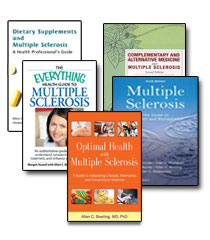
FAQ
What is your general approach to treating Multiple Sclerosis?
I believe that there should be a broad-based approach to treating and managing Multiple Sclerosis. The treatment of Multiple Sclerosis is sometimes discussed in very standardized and scientific terms. I believe in a very rigorous scientific approach—in addition to my Multiple Sclerosis, I also have a PhD in pharmacology and have done basic science and clinical research. However, I recognize that we don’t fully understand the disease process of Multiple Sclerosis, don’t currently have a cure, and thus shouldn’t “put all our eggs in one basket.” My overall approach is more like that of a thoughtful gambler than of a scientist—I believe in using a variety of therapies that are appropriate for the individual and also do the best at getting all the “good chips” that we can without causing harm. This means pushing as hard as we can with medications to treat the disease and its symptoms, but also addressing other issues such as lifestyle strategies and, if relevant, unconventional therapies.
Multiple Sclerosis is unpredictable….how can I know how my Multiple Sclerosis is going to progress?
Multiple Sclerosis is indeed an unpredictable disease, but we can get some indication early on about the “activity” of the disease. Then, over time, we can monitor disease activity with various measures—the three main measures are how you feel (especially noticing whether you are having attacks), what I see on the neurological exam, and what we see on MRI’s. Using these measures, we get a sense for how the disease is progressing. Closely tracking these measures allows us to get a sense of disease severity over time and, importantly, allows us to “ramp up” or change treatment if the disease appears to be getting more active.
What is unique about your practice?
There are several unique features to my practice. First, in terms of neurological care, I focus exclusively on Multiple Sclerosis. Since I write books and articles on Multiple Sclerosis and speak at conferences regularly, I am able to diagnose and treat the disease with cutting-edge approaches. In addition, in this time of financially restricted, bare-bones medical care, I am actually directly involved in all aspects of my patients’ care. For me, ongoing patient care and education are the core of what I do and I therefore work very hard to provide these services at the highest quality level. In order to do that, I see patients on a day-to-day basis and am directly involved in reviewing test results and medication management.
There are other services that I think are critical to complement patient care. The majority of people with Multiple Sclerosis are interested in lifestyle approaches and alternative medicine—as a result, I have spent years training myself and writing books and articles on these topics. I am an international authority on lifestyle and alternative medicine and thus can incorporate these into my practice. There is growing evidence that lifestyle approaches, such as exercise and diet, may have an impact on brain health and on Multiple Sclerosis—I incorporate lifestyle monitoring and education into my practice as well. Finally, through my collaboration with the Colorado Neurological Institute (CNI), I am able to offer a whole range of other Multiple Sclerosis specific services, including clinical trials, rehabilitation medicine (including physical therapy, occupational therapy, and speech therapy), psychological services, and neuroradiology.
Are there any diets or supplements that can be helpful for Multiple Sclerosis?
The area of diet and supplements may be very controversial and confusing. I basically think of this area in three general ways. First, regardless of any specific approach, it is important for you to have a well balanced diet. Second, it may be helpful to take in relatively high amounts of nutrients that may have a beneficial effect on Multiple Sclerosis. Finally, one should avoid supplements—such as those that are immune-stimulating—that may worsen Multiple Sclerosis and inhibit the effects of Multiple Sclerosis medications. In my practice and through my writing, I am able to provide practical guidelines on how to incorporate these strategies into day-to-day life.
Do you think exercise is important?
I like to say that if exercise was a medication it would be the most common prescription that I write. There is growing evidence that exercise may have a wide range of beneficial effects on brain health generally and on Multiple Sclerosis specifically. Exercise may change the chemistry of the brain in ways that can potentially improve multiple Multiple Sclerosis symptoms. Some of the chemical changes may also protect the nervous system from injury by conditions like Multiple Sclerosis. Exercise has the potential to change the “wiring” of the nervous system to optimize your functioning. In addition to all of these effects, exercise has many general heatlh benefits.
Due to all of these beneficial effects of exercise, I incorporate physical activity into the treatment plan for all of my patients. This is done through a variety of approaches. I have the privilege of working closely with a rehabilitation physician, Dr. Karen Theriot, and rehabilitation specialists at the Colorado Neurological Institute (CNI). Through our collaborative work, we are able to develop, monitor, and modify exercise programs to meet the individual needs of people with Multiple Sclerosis.

